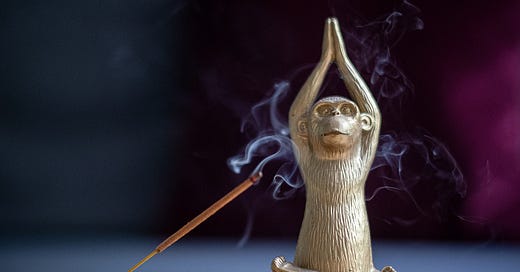A little over two weeks ago, we (re)appreciated the small routines that make our lives. But I didn’t mention one type of routine then, and it’s been tiptoeing around the inside of my skull ever since.
Rituals.
The term is sometimes used quite broadly (“Here’s my morning ritual”), but it has a narrower meaning too: a (set of) routine(s) that extends beyond the family unit, often in a traditional and/or spiritual-religious context.
Religious scholar Catherine Bell laid the foundations of modern ritual studies by identifying six crucial, related elements in every ritual:
Formalism: rigidly organized
Traditionalism: always appeals to some tradition
Invariance: same every time
Rule-governance: there are always rules about what you can(‘t) do
Sacral symbolism: symbols and objects are part of the proceedings
Performance: there’s a sequence of activities and/or incantations
For me, with my background in the evolution and ecology of behavior, there’s another intriguing aspect to rituals: they are a ‘human universal’. Whatever culture or society we look at, religious or not, there are always rituals. This suggests that rituals may have some evolutionary relevance. This 2020 paper by psychologists Cristine Legare and Mark Nielsen, for example, takes an explicitly biological look at rituals and concludes:
Rituals are founded on adaptations to the challenges of group living and serve critical social functions.
Rituals help us live in large groups. They connect us, provide us with a social identity, and can even serve as a knowledge transfer mechanism.
Sounds important.
There have never been more human beings on this planet. Yet, the increasing secularisation and individualism in the (Western?) world also means that we’re losing our rituals.
I’m a big fan of secularization. I’m actually quite allergic to organized religion; unquestionable edicts from an imaginary deity that are used as tools of oppression are just not my jam.
Fortunately, rituals don’t have to be religious or even spiritual. Kong Fuzi (better known to most of us as Confucius) probably took this furthest. As philosopher Alan Jay Levinovitz explains, Confucius elevated (secular) rituals to key players in a virtuous life. Levinovitz summarizes Master Kong’s (the meaning of ‘Confucius’) teachings on ritual as follows:
Ritual is – or can be – part of all human activity. It governs greetings and conservations [sic]. It’s how you harmonise your life with the rhythms of the world.
I don’t think we need to go that far, but when convinced atheists start to congregate in Sunday Assemblies that partially resemble religious services, I can’t help but wonder whether we need new rituals for our modern world. Another point in favor of secular rituals is that these atheist ‘services’ measurably increase participant well-being — even more than non-assembly social activities.
The authors of that last study go as far as to conclude (bold is mine):
Aspects of the Sunday service that members perceived as most important, both for creating a sense of community and for friendship formation, were the informal socialising and cooperating that occurs before and after the service itself. Secular congregations may be a viable alternative for non-religious people (and perhaps especially men) who seek the health benefits that religious communities have traditionally offered.
As someone who leans toward the introvert side of the spectrum, congregating in large groups to sing kumbaya doesn’t appeal to me as much as it might to others. Yet, that doesn’t mean I don’t feel the desire - maybe even the visceral need - for community and kindred spirits. Perhaps even more than most, because I am introverted and connection takes more initial effort to achieve but (possibly) runs deeper when it has been achieved.
What could rituals look like in our culturally changing and increasingly virtual world? How do we (should we?) include modern technology? Do you think we need new rituals? Comment below etc.
See you next week.
Amen.
Thanks for coming to our weekly service. Go forth and spread the word — it helps this newsletter more than you know.







I presume all human beings are quite fond of rituals, the only problem seems te be that those rituals change with time. Going to church was a ritual, but nowadays we have rituals like : "watch 40x a day at your smartphone screen" or "read a chapter in a educational book ('How to raise children' etc) every day"...I see rituals as traditions. And traditions have 1 important function : to disappear after a long time to make way for other traditions. They will always be a part of humankind, just like rituals.
It seems to me that the driver behind ritual might be our ease seeking nature much like the myelin coating on our nerves make thinking faster and easier but fixate our thoughts.